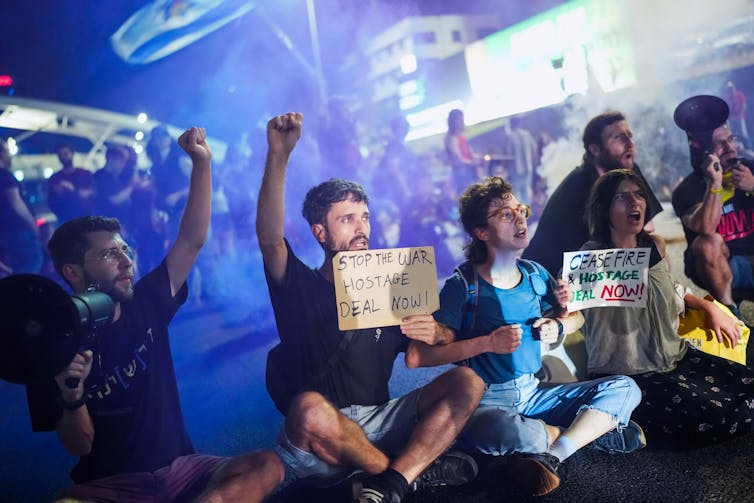Hezbollah intensified its attacks in northern Israel on June 2, firing barrages of rockets over the border that set off massive wildfires. This came two days after the Lebanese armed group revealed that it had downed one of Israel’s most advanced drones – the most recent of several successful air defence operations.
The events of October 7 had already marked the collapse of Israel’s national security doctrine. Three of the four components – deterrence, early warning and defence – had failed completely. The conflict with Hezbollah, which Israel has been fighting alongside its war on Gaza, continues to damage these beyond repair.
Hezbollah, which is part of the broader Iranian-backed “axis of resistance” with the Ansarullah (commonly known as the Houthi) movement in Yemen and other groups in Syria and Iraq, has demonstrated its developing military, intelligence and media capabilities since the start of Israel’s war on Gaza.
The group has gradually introduced new missiles to the conflict that are more precise and destructive. And it has also demonstrated its ability to identify weaknesses in Israel’s air defence systems, generate targets and execute complex operations almost daily.
On June 3, for example, Hezbollah announced that it had launched a squadron of drones towards the headquarters of the Israeli military’s Galilee formation (the division responsible for the front with Lebanon) for the first time. Most of Hezbollah’s drones are successfully penetrating Israeli air space because they are flown at low altitudes to avoid detection.
The recent increase in violence across the border is, at least in part, a consequence of Iran’s attack on Israel in April. The attack, although widely claimed a failure, was ultimately a strategic move that looks to be bearing strategic fruit for Hezbollah.
It marked a change in Tehran’s calculus and showed that Israel cannot protect itself from retaliation, nor can it deter attacks, without the help of its Arab and western allies.
It is also safe to say that Israel no longer enjoys unfettered air superiority and freedom of action over Lebanon. On May 14, Hezbollah downed an Israeli surveillance balloon, and attacked its launch base and the controller used to operate it.
The group has also downed several of Israel’s most reliable and advanced drones. On June 1, for example, it downed a Hermes 900 drone worth around US$10 million (£7.8 million), for the second time.
Waging a psychological war
The growing threat posed by Hezbollah has instilled a feeling of anxiety and pessimisim among Israelis. This is giving Israel’s deeply polarised society more reason to question the conduct of the country’s political and military leadership.
Hezbollah has inflicted serious damage on settlements in northern Israel, many of which are now abandoned. The mayor of Metulla on the Lebanese border has said he is “sure that 30% to 40%” of the town’s settlers will “never return”.
Other mayors along the conflict line in the Galilee region, where over 96,000 Israelis remain displaced, have threatened to announce “unilateral separation from the State of Israel”. Their fury is directed primarily at Israel’s prime minister, Benjamin Netanyahu, for abandoning the evacuees.
The government had promised displaced people a plan to restore the north and accommodate their return. But on May 22 it rejected the plan’s approval and postponed voting on it. Netanyahu has refused to specify a time when the evacuees would be able to return, saying he is “not going to tell Hezbollah what we are going to do”.
The failure to fulfil these promises has only lessened the already waning faith and confidence of Israelis in their government and its management of the war in Gaza. Netanyahu has made countless threats against Hezbollah over the course of the war. But they have failed to deter the group from launching attacks on Israel.
According to Israeli journalist Nahum Barnea, frontline generals in Israel have eventually come to adopt the position that deescalation in Lebanon will only be possible if the war in Gaza stops. This is the same stance that Hezbollah has held since the start of the war.
In an article on Ynet, a major Israeli news website, Barnea claimed that the intense situation on the Lebanese border is motivating Israel’s military to support a deal that enables the release of hostages held by Hamas, as it would “allow for prospects of an agreement in the north”.

The military’s new stance looks to be a way of disentangling itself and the government from the complex situation the conflict with Hezbollah has caused. It seems that the army is neither able to continue adapting to the escalating pressure on the battlefield, nor is it willing to launch a large-scale war with Hezbollah given its dangerous repercussions.
This new reality has widened the consensus among the Israeli security establishment that the mandate of the Israeli delegation to the ceasefire-hostage talks should be expanded. And on May 23 the war cabinet voted to lengthen the “leash” of Israel’s negotiation team, a move that Netanyahu had previously been against.
Israel now faces its biggest existential threat from Hezbollah, which is constantly learning, gaining experience from the battlefield and developing by the day.

